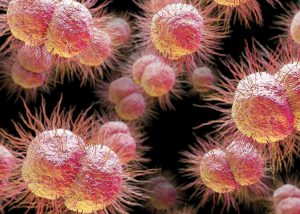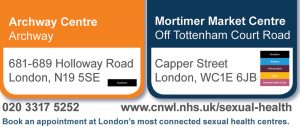In a special series our Boyz Doc, Dr Laura Waters from Mortimer Market Centre, will be focussing over the next few weeks on the main sexually transmitted infections gay men are at risk from. This week it’s Gonorrhoea.

Gonorrhoea is a bacterial sexually transmitted infection (STI) accounting for more than 1 in 10 of the 422,000 STIs in the UK in 2017. Worryingly, gonorrhoea rose by 22% compared to 2016, driven particularly by rising cases in gay men. Gonorrhoea can infect several places including the throat, penis and bum. People often assume they’ll have symptoms but throat and bum infections only cause symptoms in about 10% of cases. In contrast, penile infections cause symptoms 90% of the time, most commonly discharge or pain when peeing.
Symptoms usually start within a few days of getting the infection. Uncommonly gonorrhoea infects the testicles (causing pain and swelling) or the prostate gland (pain and difficulty weeing). Infections of the eye, causing pain, redness and weeping, are rare. In less than 1 in 100 cases the infection spreads through the bloodstream and can cause arthritis (pain and swelling of a joint) or a skin rash.
Gonorrhoea is considered very infectious as there is a 1 in 5 to 1 in 2 chance of getting the infection after a sexual exposure; ejaculation does not need to occur for a transmission to take place. The more times you have sex with an infected person, the higher the risk.
Throat infections account for lots of gonorrhoea cases and, because symptoms are unusual, may go undiagnosed for a long time, leading to more transmissions. It’s unknown how important kissing only might be for gonorrhoea as this has been analysed in only one Australian study. The Australians have also produced data suggesting an antibacterial mouthwash (they studied Listerine) might help clear gonorrhoea from the throat – bigger studies are awaited!
A sexual health clinic can look at swabs from the penis or bum under the microscope to tell you immediately if you have gonorrhoea – this test is not 100% accurate so can miss cases; it’s important to wait for all your test results. If you’ve had sexual contact with someone with gonorrhoea you may be offered treatment immediately but this is something we are moving away from to reduce unnecessary antibiotic use and drug resistance. The clinic will send away samples from your throat, bum and penis/urine sample to do laboratory tests for gonorrhoea and chlamydia, as well as blood tests for syphilis, hepatitis C and HIV, as required.
A major concern about gonorrhoea is resistance where the bug mutates to make antibiotics less effective. We used to use two antibiotics to treat gonorrhoea – azithromycin tablets and a ceftriaxone injection to try to reduce the risk of resistance; unfortunately there has been rising resistance to azithromycin (in gonorrhoea and other STI bacteria); this might be acceptable if azithromycin was ‘protecting’ the other antibiotic but there have been increases in ceftriaxone resistance too. The first ever case of gonorrhoea resistant to both antibiotics was reported in the UK in 2018, closely followed by two cases in Australia; all were linked to travel to South East Asia. This month there have been two more reports of gonorrhoea resistant to both drugs in heterosexual women in London. Seeing more difficult to treat STIs in an era of huge budget cuts and closures of sexual health clinics is concerning to say the least!
The latest British guidelines have dropped the azithromycin (since it’s probably doing more harm than good) and recommend a single injection of ceftriaxone at a higher dose. Public Health England keep a close eye on levels of gonorrhoea resistance and it’s important that people have a ‘test of cure’, repeat gonorrhoea tests about 12 weeks after treatment, to make sure the infection has cleared. If it hasn’t this should prompt a careful check for resistance.
If you are having new sexual partners then get a STI check every 3 months routinely, if you have symptoms or if one of your sexual partners tells you they have an infection. Avoiding sex while waiting for your results and, if you’re treated for gonorrhoea, for a week after treatment, will help reduce transmission. Remember oral sex is an important route for gonorrhoea transmission – condoms for fellatio or dental dams for oro-anal sex (rimming) will reduce gonorrhoea transmission but are not commonly used. There’s no vaccine for gonorrhoea, although an old vaccine for meningitis (against a bacteria from the same family as gonorrhoea) seems to provides some protection so maybe there will be in the future.
The Boyz Doc is Dr Laura Waters, an HIV and sexual health consultant at the Mortimer Market Centre in central London. Dr Laura answers your questions every week in Boyz. If you have a question for Dr Laura please email her at [email protected]















